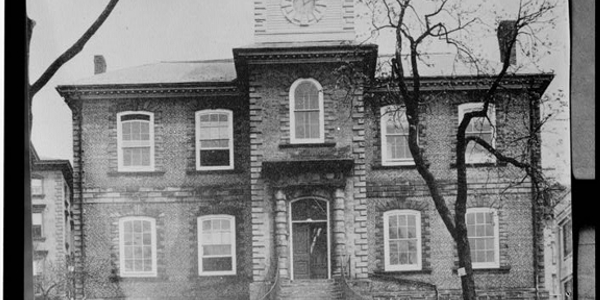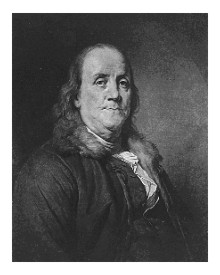Sponsor this page. Your banner or text ad can fill the space above.
Click here to Sponsor the page and how to reserve your ad.
-
Timeline
1784 Detail
March 1, 1784 - All children born after this date in 1784 in Rhode Island are free. Rhode Island's passage of its Emancipation Act provided for the gradual abolishment of the right to hold slaves.

Stephen Hopkins, signer of the Declaration of Independence, was himself a slave holder, but after his second marriage to a Quaker woman, began to rethink the practice. He started to release male slaves and introduced a bill into the Rhode Island Assembly to prohibit the importation of slaves into the colony in 1774. No longer would new slaves be brought into the colony. The law was enacted not only on those moral Quaker grounds, but also to hurt the British slave trade.
In 1784, after the American Revolution was won, the Rhode Island Assembly revisited the idea of slavery on December 4, 1783, passing the law for its gradual elimination. Did the passage of the law end slavery or even the importation of slaves after its passage? Not completely. Newport merchants defied the law. Even after the Rhode Island Assembly strengthened their slavery laws in 1787 to include a ban on any Rhode Island native participating in the slave trade, even to other nations or states, traders flaunted it. It is estimated that 40,000 slaves were transported by Rhode Island traders to the southern United States or the Caribbean after 1787.

Eventual Abolition
The north was engaged, after the American Revolution, for the most part in what would be termed eventual abolition. Only two states, Vermont and Massachusetts, banned slavery outright. Others, such as Pennsylvania, Connecticut, New York, Rhode Island, and New Jersey passed eventual abolition laws. Gradually, however, slavery was reduced in the north. By 1790, 40% of African Americans were free in northern states; by 1810, it was 74%. In 1820, the percentage rose to 84%. In 1840, 99% were free. For Rhode Island, that percentage changed in a slightly different, but accelerated manner, precipated by those early laws and the Quaker influence. In 1790, 79% of Rhode Island African Americans were free. By 1810, it was 97%, and by 1820, it was 99%.
Full Text, An ACT authorizing the Manumission of Negroes, Mulattoes and others, and for the gradual Abolition of Slavery, February 26, 1784
WHEREAS all Men are entitled to Life, Liberty, and the
Pursuit of Happiness, and the holding Mankind in a State
of Slavery, as private Property, which has gradually obtained by
unrestrained Custom and the Permiflion of the Laws, is repugnant to this Principle, and subversive of the Happiness of Mankind, the great End of all civil Government:
BE it therefore Enacted by this General Assembly, and by the
Authority thereof it is Enacted, That no Perfon or Perfons, whether Negroes, Mulattoes, or others, who shall be born within the Limits of this State, on or after the First Day of March, A. D. 1784, shall be deemed or considered as Servants for Life, or Slaves, and that all Servitude for life, or Slavery of Children, to be born as aforesaid, in Consequence of the Condition of their Mothers, be, and the same is hereby taken away, extinguished and for ever abo-lished.
And whereas Humanity requires, that Children declared free as
aforesaid remain with their Mothers a convenient Time from and
after their Birth; to enable therefore those who claim the Services of such Mothers to maintain and support such Children in a becoming Manner. It is further Enacted by the Authority aforesaid, That such Support and Maintenance be at the Expence of the respective Towns where those reside and are settled: Provided however, That the respective Town-Councils may bind out such Children as Apprentices, or otherwise provide for their Support and Maintenance, at any Time after they arrive to the Age of One Year, and before they arrive to their respective Ages of Twenty-one, if Males, and Eighteen, if Females.
And whereas it the earnest Desire of this Assembly, that such
Children be educated in the Principles of Morality and Religion,
and instructed in Reading,- Writing and Arithmetic: Be it further Enacted by the Authority aforesaid, That due and adequate Satisfaction be made as aforesaid for such Education and Instruction. And for ascertaining the Allowance for such Support, Maintenance, Education and Instruction, the respective Town-Councils are hereby required to adjust and settle the Accounts in this Behalf from Time to Time, as the same shall be exhibited to them: Which Settlement to made shall be final; and the respective Towns by Virtue thereof shall become liable to pay the Sums therein specified and allowed.
AND be it further Enabled by the Authority aforefaid, That all
Perfons held in Servitude or Slavery, who shall be hereafter emancipated by those who claim them, shall be supported as other Paupers, and not at the separate Expence of the Claimants, if they become chargeable; provided they shall be between the Ages of Twenty-one Years, if Males, and Eighteen Years, if Females, and Forty Years, and are of found Body and Mind; which shall be judged of, and determined by the Town-Councils aforesaid.
IT is Voted and Resolved, That the Whole of the Clause contained Clause in an in an Act of this Assembly, passed at June Session, A. D. 1774, per- Act passed in missing Slaves brought from the Coast of Africa into the Weft-Indies, June 1774 respecting,
on board any Vessel belonging to this (then Colony, now) State, and Importation of Slaves who could not be disposed of in the West-Indies, be, and the same is hereby repealed.
AND it is Enacled by this General Assembly, and by the Authority
thereof, That for the future no Negro or Mulatto Slave be brought into this State, to be disposed of or sold, under any Colour or Pre-text whatever, any Law, Custom, or Usage to the contrary not-withstanding.
Photo above: Old State House in Providence built 1760, Historic American Buildings Survey. Courtesy Library of Congress. Below: Image of a Rum Trade Boiling House, Date and Original Source Unknown. Courtesy Brown University Library. Sources: "Slavery, emancipation and Black freedom in Rhode Island, 1652-1842" by Christy Mikel Clark-Pujara, 2009, University of Iowa; Slavery and Justice report of the Brown University Steering Committee on Slavery and Justice; Acts and Resolves of Rhode Island 1784 via Hathitrust.org; Wikipedia Commons.







